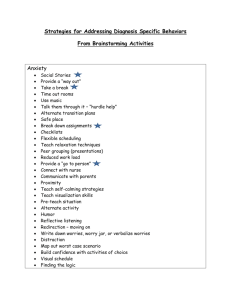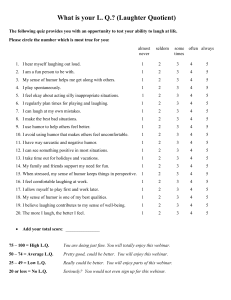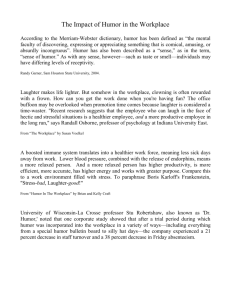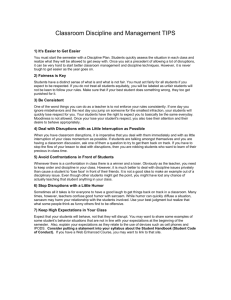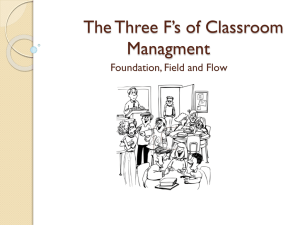What makes a good teacher?
advertisement
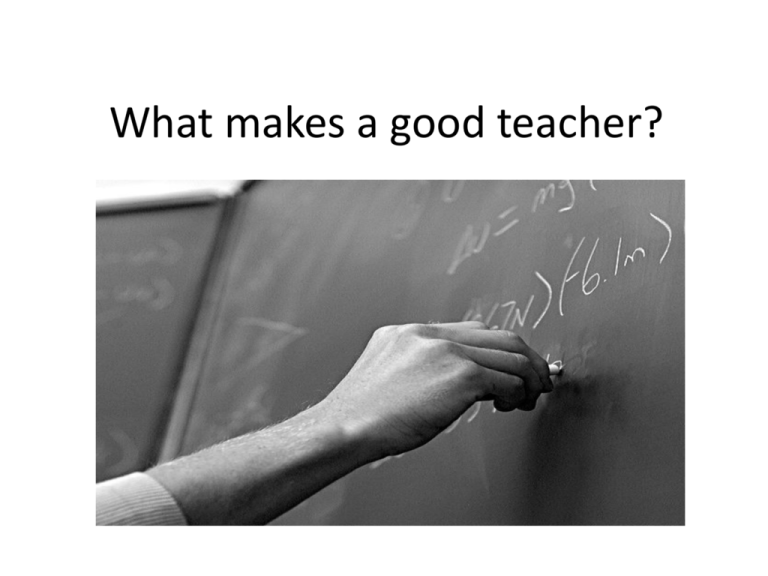
What makes a good teacher? Think back to your school days for a moment, who were your favorite teachers? Which ones did you learn more from and why? Complete the following sentence about you • When I was at school, the best teacher was… • To be a good teacher, of course, you need a basic level of knowledge. • And you need to have teaching skills. • A good teacher must like children and like to be around them. • Think about coaching football. You don't need to be the best player in the world to be the best coach. Top Keys to Being a Successful Teacher The most successful teachers share some common characteristics. Here are the top keys to being a successful teacher. Every teacher can benefit from focusing on these important qualities. Success in teaching, as in most areas of life, depends almost entirely on your attitude and your approach. Sense of Humor • A sense of humor can help you become a successful teacher. Your sense of humor can relieve tense classroom situations before they become disruptions. • Most importantly, a sense of humor will allow you to see the joy in life and make you a happier person as you progress through this sometimes stressful career. • The ability to occasionally laugh, and encourage your students to join in, can place the lesson back on track and develop a sense of camaraderie between a student and a teacher. A Positive Attitude • A positive attitude is a great asset in life. You will be thrown many curve balls in life and especially in the teaching profession. A positive attitude will help you cope with these in the best way. 3. High Expectations • An effective teacher must have high expectations. You should strive to raise the bar for your students. If you expect less effort you will receive less effort. You should work on an attitude that says that you know students can achieve to your level of expectations, thereby giving them a sense of confidence too. . 4. Consistency • In order to create a positive learning environment your students should know what to expect from you each day. You need to be consistent. This will create a safe learning environment for the students and they will be more likely to succeed. 5. Fairness • Many people confuse fairness and consistency. A consistent teacher is the same person from day to day. A fair teacher treats students equally in the same situation. 6. Flexibility • One of the tenets of teaching should be that everything is in a constant state of change. Interruptions and disruptions are the norm and very few days are 'typical'. Therefore, a flexible attitude is important not only for your stress level but also for your students who expect you to be in charge and take control of any situation. Treat your students with respect • The basic first step to earn your students’ respect is to simply be nice to them Involve the families Involve the families. Parents are a child's first teacher, and they know their child the best. • Teaching can be challenging, exhilarating, stressful and rewarding all at once. It is a profession that requires continued growth, open-mindedness and flexibility. Following these steps will help you on your way to becoming a successful teacher Complete the following sentence • I think the best English teacher should be… What makes a good teacher? 1. They should make their lessons interesting so that you don’t fall asleep. 2. A teacher should love his/her job. If he/she really enjoys it, that’ll make the lessons more interesting. 3. I like the teacher who has his own personality and don’t hide it from the students so that he is not only a teacher but a person as well- and it comes through the lessons. 4. I like teachers who have lots of knowledge, not only of their subjects. 5. A good teacher is an entertainer and I mean that in a positive sense, not a negative one. What makes a good teacher? 6. It is important that you can talk to the teacher when you have problems and you don’t get along with the subject. 7. A good teacher is … somebody who has an affinity with the students they are teaching. 8. A good teacher should try and draw out the quiet and control the more talkative ones. 9. She should be able to correct people without offending them. 10. A good teacher is … someone who helps rather than shouts. 11. A good teacher is … someone who knows our names. Good Teacher Recipe • • • • • • • • • • • • • • 2 buckets of creative juices 20 pounds of patience 60 strands of sensitivity 3 large cans of a hearty sense of humor hands on activities buckets of praise oodles of encouragement 1 jar of organizational skills 3 pats of listening skills close contact with parents dedication patience flexibility frosting sense of humor chips decorate children with power and leadership skills Help yourself! And thank you for attention! Continue your own education Continue your own education. The first step to becoming a successful teacher is to never stop learning. There is always new research being published that examines ways to reach all types of students. By keeping up with current research, you will feel armed with ideas when faced with a new, difficult situation. Be organized • Be organized and go into each day with a structured, well-prepared lesson plan. However, realize that the day may not always go as intended. Often, a class may lead a lesson in a direction you weren't expecting, but it's important to be flexible and allow for the fluidity of learning. Tips & Warnings • Successful teaching is about developing good relationships with students. Only when a student respects you as a teacher, will she begin to learn. There will be some students who are great challenges. Keep your mind open and always be on the lookout for ways to help them succeed. Tips on Becoming a Successful Teacher By Mike Biscoe, eHow Contributor Teachers have a critical responsibility. Directly influencing the development of every child in the classroom at a crucial stage in their development, the teacher lays an educational foundation that students will use to comprehend and navigate the world for the rest of their lives. While that can be tough to do effectively, there are some strategies to help you. • Preparation – • Students will sense your disorganization and reward you by quickly losing interest. Having organized lessons ahead of time means classes can proceed at a pace conducive to your student's level of interest. Additionally, being organized and prepared means a more certain teacher. On a broader level, a lesson plan for the year, whether in outline or in more comprehensive form, will remind teachers where they are at each stage of the year. Flexibility – • Though your lesson plan may be detailed down to the smallest detail, be prepared to change things on the drop of a dime. If an exercise doesn't seem to hold the students interest be flexible and change direction, even if only for that one section. Disruptions are a part of classroom life and a good teacher will need to be able to flow with it instead of fight it. Caring – Show your students that you care about them. Only go through the motions and your students are certain to do the same. Showing you care may mean listening to student concerns, offering a compliment, flashing a smile or even a supporting hand on the shoulder. This creates a comfortable environment where students will ultimately feel more comfortable expressing themselves and learning new concepts. Parents also need to understand the level of concern you have for their children as this will propel them to encourage their child. • – Discipline Discipline with grace whenever possible. Disruptions do happen, and dealing with these disruptions in a way that maintains everyone's integrity is important. Always consider addressing the classroom as a whole rather than singling a student out when possible. Embarrassing a student is a sure way to turn him against you. If direct confrontation is necessary, speaking to a child in private is always a much preferable strategy. • Humor – Classrooms can regularly become cauldrons of anxiety due to demands of a specific subject, required examinations or outside influences. Before a disruption reaches the ignition stage, the ability to occasionally laugh, and encourage your students to join in, can place the lesson back on track and develop a sense of camaraderie between student and teacher.
